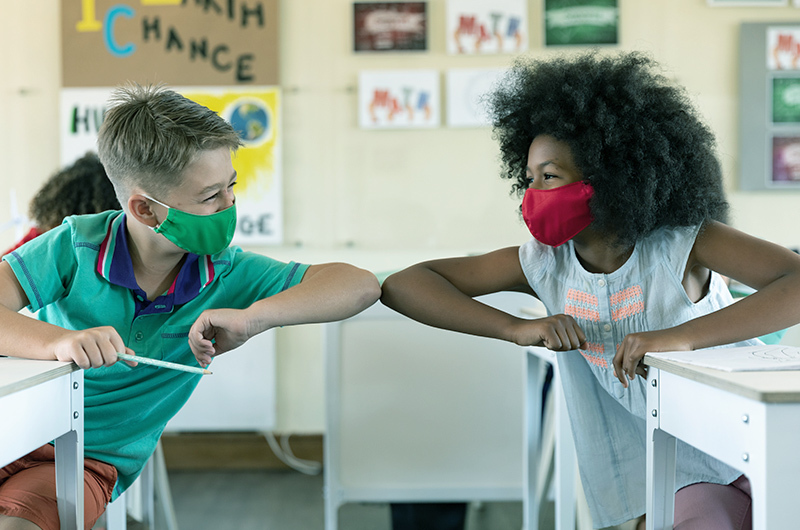Back to school… back to what?

This month, many children and teens in Massachusetts and around the country are finally heading back to school in person. For some kids this news might elicit jumps for joy, while others might feel nervous or afraid.
Wherever you or your kids land on this range of feelings, there will no doubt be an emotional learning curve as kids get back to the classroom. For help navigating this new chapter in the pandemic, we turned to Erica Lee, a psychologist in the Department of Psychiatry at Boston Children’s Hospital.
What might kids be feeling as they head back to school?
As it’s been for so much of the pandemic, it’s open season for all kinds of feelings. Kids will likely feel a wide range of emotions, from happy to scared and everything in between — it really depends on the individual child. But many kids have mixed emotions about returning to school. For some kids and families, being home worked really well, and for others, it was much harder.
Whatever your kids are feeling, it’s important to acknowledge that this may be a hard transition. While it might feel fantastic to many parents, it’s a big change for kids. Many have been out of the routine of going to school — and learning and socializing in the usual ways — for over a year, and it may take some time to settle back into that routine.
How can parents help with this transition?
I have a few suggestions of ways parents can be supportive:
- Talk with your kids. Ask them how they’re feeling about school and if they have concerns. Let your kids know it’s okay to have different feelings about the transition. Explain they might not have the same kinds of feelings as their siblings or friends, and that’s okay, too. Make space for them to talk about how they’re feeling and validate those feelings, whatever they are.
- Work out a plan. School will look different than before, so talk through what the school day might look like. This is especially helpful for younger kids, as they may not remember or can get more confused by any changes. Talk about how they will get to school, what their classroom might look like, and what to expect during lunch and recess. If you don’t know the answer to these questions, reach out to your child’s school or teacher.
- Talk through any misconceptions. If your kids have heard scary rumors or express concern about the safety of school, go over the facts. You can review the school’s safety protocols together (such as wearing masks, washing hands, and using hand sanitizer) and talk about other rules their school has in place to help keep them safe.
- Ease into the new routine. If you have time, try to transition your kids into their new routines. For example, you might want to start going to bed earlier, getting up earlier, setting regular mealtimes, and putting limits on screen time before bed. Younger kids may like having a visual schedule that approximates a school day.
- Help them socialize. If possible, safely socialize with other kids from school. Some kids have not spent a lot of time with other children in over a year, and it can be overwhelming to return to a full school. Younger kids may especially benefit from practicing safe playtime with others before heading into the classroom.
- Create a coping plan. If your child is especially nervous about going back to school, help them make a “cope ahead plan” that outlines what they can do to feel better at school. This might include a list of adults they can go to if they need help, such as a teacher or counselor. Or they might use other coping skills, such as deep breathing, playing with a fidget toy, or thinking calming thoughts. For many kids, just knowing there’s a plan in place can help give them a sense of control.
- Partner with your school or teacher. Schools understand that many kids will need time to adapt to this transition. If your child needs extra support, don’t hesitate to reach out and ask them to help you come up with a plan together.
- Focus on the positive. Even for kids who are scared about going back to school, there is usually at least one thing they are looking forward to. This might be seeing their friends or a favorite teacher, having recess again, or learning in their usual environment. Help them find something positive and focus on the emotions that accompany it.
- Don’t forget about self–care. We’ve all been under so much stress for the past year and it’s still a stressful time for families. I always remind parents that it’s so important to take care of yourself, especially when you’re working hard to take care of others. Plus, kids look to their caregivers for how to respond to stressful situations. Try to find some time every day to do something for yourself, whether that’s taking a walk, talking to a friend, or savoring your morning cup of coffee without checking email at the same time.
What signs might mean your child is not coping well?
There are some typical signs we look for that might mean your child needs extra support. These include:
- sadness or lower mood
- being more irritable or cranky
- isolating from family or friends
- disinterest in usual or preferred activities
- not wanting to go to school or avoiding schoolwork
- hurting themselves or talking about suicide
If you notice any of these signs, check in with your pediatrician or a behavioral health specialist to get help and make a plan.
Learn more about Boston Children’s response to COVID-19.
Related Posts :
-

Back to school during COVID-19: Children with special needs
If this were a normal year, summer would be wrapping up and kids would be returning to the routines of ...
-

COVID-19: What we know and how to cope with an uncertain future
Last March, when the world as we knew it shut down because of the coronavirus, we imagined we’d be ...
-

Anxiety in kids during COVID-19: What parents should know
Some kids hide in their rooms. Others turn their cameras off during remote learning and don’t want to talk ...
-

Help your child manage anxiety about school violence
With news of school shootings and other violence often reaching children, parents sometimes grapple with how to help their child ...





